2020 Ibrahim Index of African Governance: Key Findings
25 November, 2020
On Monday 16 November 2020, the Mo Ibrahim Foundation released the latest iteration of the Ibrahim Index of African Governance (IIAG), with an updated framework and strengthened indicators. The IIAG measures governance performance across 54 African countries, with the 2020 iteration covering the period from 2010 until the end of 2019.
The Foundation defines governance as the provision of political, social, economic and environmental public goods and services that every citizen has the right to expect from their government, and that a government has the responsibility to deliver to its citizens.
Governance performance slows, and score declines for the first time in 2019
The 2020 IIAG results show that governance in Africa has improved over the last decade, with more than 60% of Africa’s population living in the 36 countries where governance has improved since 2010.
The overall picture, however, is not fully positive, with some concerning trends in more recent years. The African average score for Overall Governance has declined in 2019 for the first time over the ten-year period. This follows a wider trend of slowing improvement in the latter half of the decade, with the rate of progress in Overall Governance having halved since 2015.
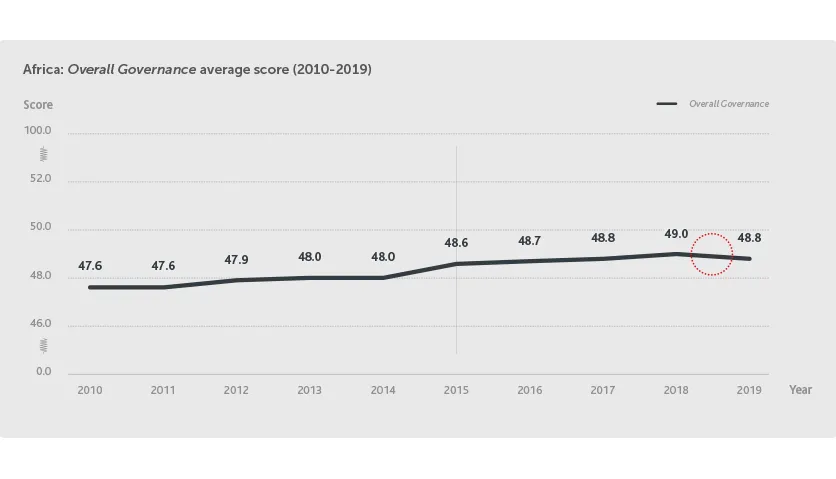
The continent’s progress is unbalanced
Governance performance in the last decade has been unbalanced across governance dimensions.
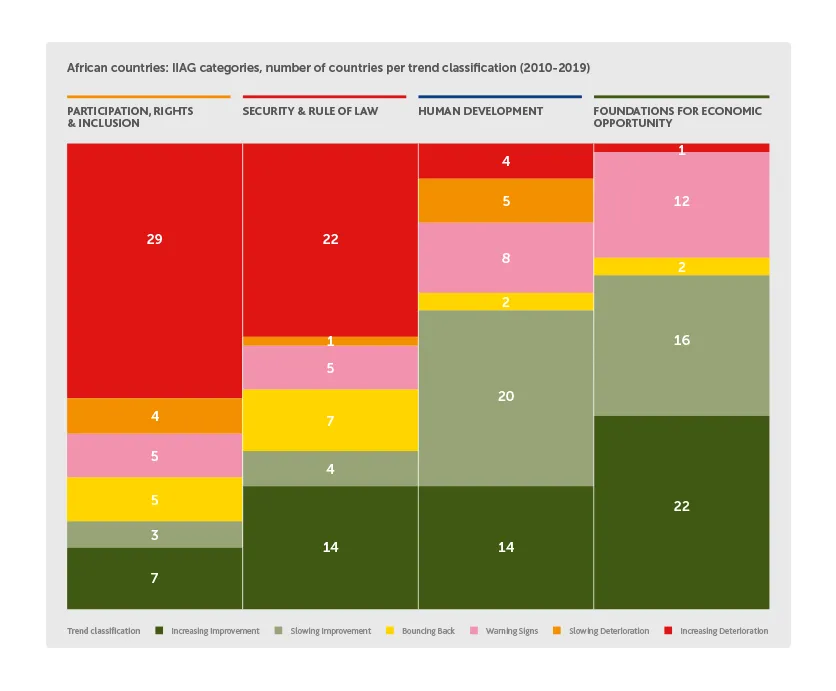
Over the decade, progress has come on the back of improvements in the Foundations for Economic Opportunity and Human Development categories, with the most gains seen in the areas of infrastructure, health, and environmental sustainability.
The main drivers of decline over the decade are the Participation, Rights and Inclusion and Security & Rule of Law categories. The rate of deterioration in the former has even accelerated over the last five years, contributing to the slowdown at governance level. These declines have occurred primarily due to a worsening security situation and an increasingly precarious environment for human rights and civic participation.
Since 2010, 20 countries, hosting 41.9% of Africa’s population, have made progress in both Human Development and Foundations for Economic Opportunity but at the same time also declined in both Security & Rule of Law and Participation, Rights & Inclusion.
Only eight countries have managed to improve in all four categories over the decade, while Ethiopia is the only country to have improved in all 16 sub-categories.
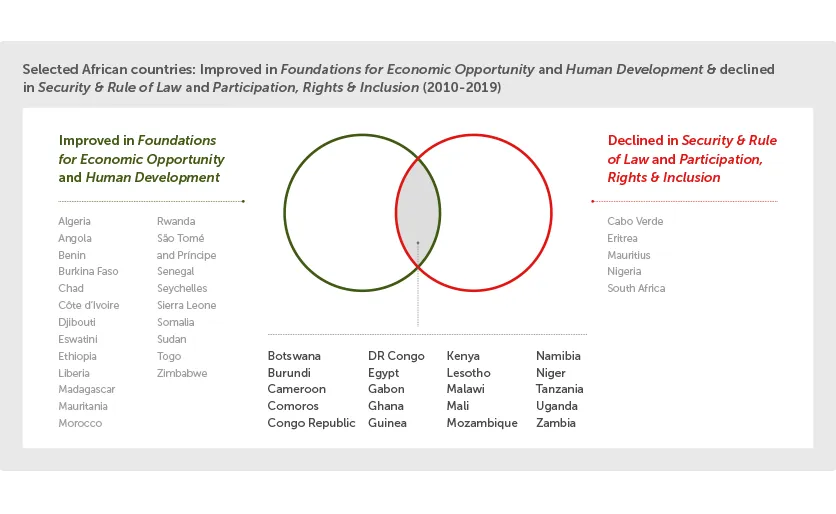
COVID risks reversing governance gains
While governance on the continent has improved in the past decade, the decline in 2019 is all the more concerning due to COVID-19, which is set to exacerbate existing challenges and reverse some of the positive gains.
From a health perspective, the pandemic has brought to the fore gaps in Africa’s health systems, though as of yet, the continent has not been hit as hard as other regions. However, the fallout from COVID may well compound already alarming trends in security, human rights, and the participatory environment. Measures to contain the virus have already been used to conceal interference with election monitoring and to restrict civic space.
However, the data show that the greatest impact of COVID-19 is on the economy. The pandemic hit the continent as it was set on a path of economic improvement, both over the last decade and since 2015. The dramatic abatement of growth and other related challenges brought about by COVID-19 will undoubtedly threaten or even reverse this key achievement.
Gap between top and bottom closing
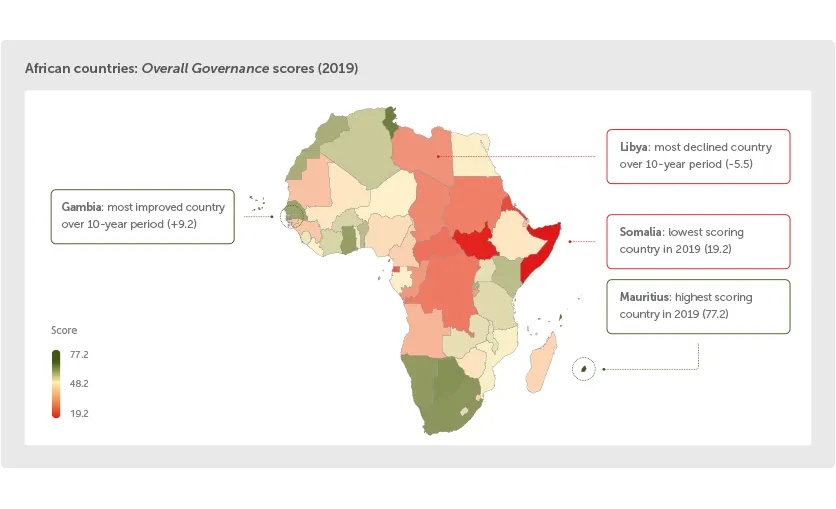
At the country level, Mauritius maintains the top position in Overall Governance in 2019 for the 10th consecutive year with a score of 77.2. Somalia, meanwhile, remains bottom for the 10th consecutive year with a score of 19.2. However, the two top and bottom countries follow opposing trajectories as the gap between them shrinks to its lowest over the decade in 2019.
Mauritius’s Overall Governance score has declined over the decade driven by weakening social protection and deteriorating human rights, while Somalia’s Overall Governance score has increased on the back of improved infrastructure and increased gender equality.
Mauritius is not the only high-ranking country to display concerning trends, with 6th placed South Africa declining at an accelerating rate since 2015 and 5th placed Botswana displaying warning signs. Similarly, Zimbabwe ranked 33rd, is among the five most improved.
However, the trends showcased by these countries do not tell the full story. Although the gap between the top and bottom ranked countries has been closing over the last decade, on average, countries’ governance performances are more dispersed in 2019 than they were a decade ago.
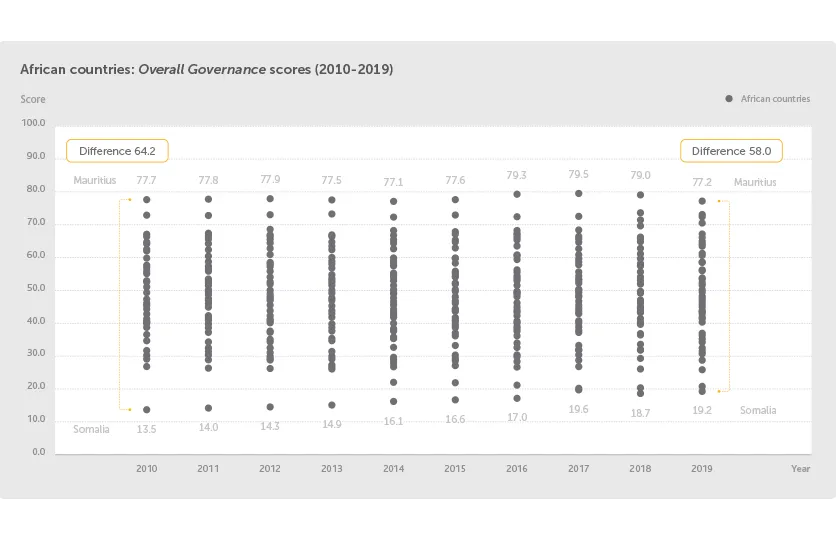
A balanced approach to all dimensions is the key driver of good governance
The 2020 IIAG results highlight the importance of balance. Both in 2019 and over the ten-year time series, the indicators showing the strongest correlation with high Overall Governance scores span the four IIAG categories. The factors most associated with good governance range from personal liberties to executive compliance with the law. They include judicial processes, equality of opportunities and rights, as well as budgetary management, statistical capacity, education quality and environmental policies.
This underlines the need for a multi-faceted approach to governance progress. This is particularly crucial as the continent’s performance is now unbalanced which risks reversing a decade of progress, as the 2019 score decline signals.


